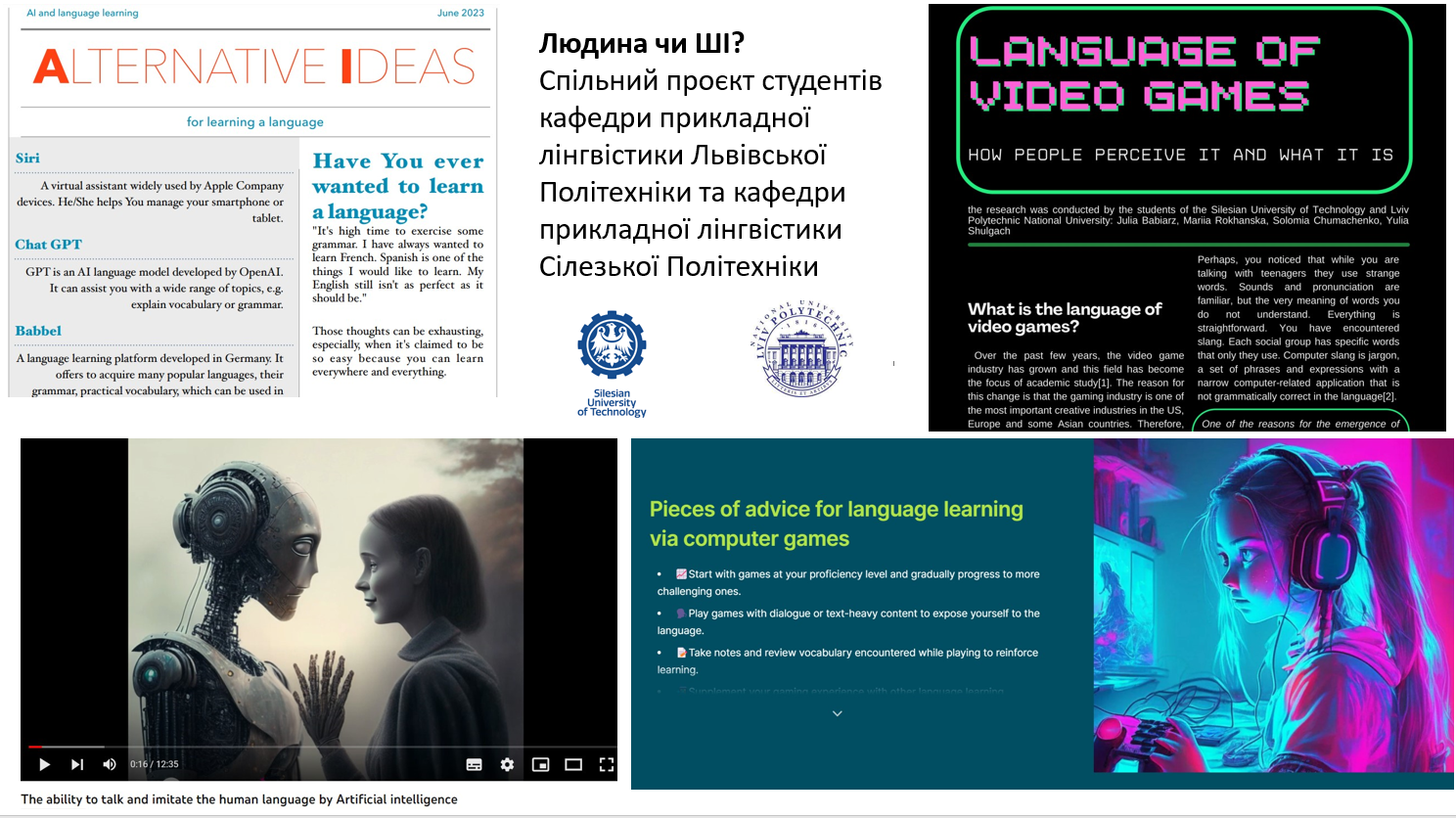Negli ultimi due mesi, gli studenti del Dipartimento di Linguistica Applicata dell'Istituto di Informatica e Tecnologie dell'Informazione del Politecnico di Lviv, insieme agli studenti del Dipartimento di Linguistica Applicata del Politecnico della Slesia (Gliwice, Polonia), hanno lavorato a un progetto congiunto studio di una serie di problemi di attualità:
- digitalizzazione e applicazione delle tecnologie dell'informazione nell'istruzione;
- sfide socioculturali e metodologiche dell'Industria 4.0;
- Società 5.0 e il suo impatto sull'apprendimento delle lingue;
- la prima/seconda/terza/quarta rivoluzione industriale e il loro impatto sul linguaggio;
- utilizzo di chatbot e assistenti virtuali nell'apprendimento delle lingue;
- il linguaggio dei giochi e dei programmi informatici.
Hanno partecipato al progetto:
- studenti del gruppo FL-13: Maria Stetsyk, Victoria Kaminska, Sofia Ferens, Anastasia Zhurbenko, Maria Rohanska, Solomiya Chumachenko, Yulia Shulgach;
- studenti del gruppo FL-37: Oksana Malysh, Snizhana Salamakha, Andrii Byblik, Oksana Milymuk, Elizaveta Nalivkina;
- Studenti del Politecnico di Slesia: Zuzanna Krzemień, Karolina Karlowska, Julia Babiarz, Zofia Potocka, Urszula Muszynska.
Congratulazioni agli studenti per il completamento con successo del progetto! Siamo orgogliosi di te e ti auguriamo nuove interessanti ricerche!
Ti invitiamo a familiarizzare con i risultati della cooperazione degli studenti.
1. «The Language of Video Games»
J. Babiarz, М. Rokhanska, S. Chumachenko, Yu. Shulhach
Can you unravel the meanings of the following abbreviations: bb, NPC, GD, or ez? If not, you instantaneously need to mingle with the community of frequent computer games users or read the article «The Language of Video Games» where a group of Polish and Ukrainian students presents the results of the survey conducted among 51 respondents from a few European countries, asking them whether they would be able to decipher both abbreviations and computer slang. The outcome is quite startling, as lagging behind linguistic changes can lead to a lack of communication and consequently deepen the generation gap. Check for yourself!
2. «AI and Language Learning. Alternative Ideas for Learning a Language»
M. Stetsyk, V. Kaminska, Z. Krzemień, K. Karlowska, S. Ferens, A. Zhurbenko
The German poet, Johann Wolfgang von Goethe, wrote: «As many languages you know, as many times you are a human being,» and living in the global world, with the ever-pressing demand for foreign language users, calls for state-of-the-art methods and techniques to facilitate the acquisition process. The most recent tool, which is all the rage now, is the ubiquitous AI, where robots and applications come to the learners’ rescue. In this project by our Polish and Ukrainian students, the world of new technologies supporting language learning, such as Siri, Chat GPT or Babbel, has been systematically reviewed and described. Do you know and use them all?
Alternative Ideas for Learning a Language
3. «The Ability to Talk and Imitate Human Language by AI»
А. Byblyk, U. Muszynska, О. Mylymuk, Ye. Nalivkina
This wide-ranging, collaborative project by students of Silesian University of Technology and Lviv Polytechnic ponders upon a most urgent question in the field of science: whether we are still able to hear the difference between robot and human speech. The survey attempts at testing the potential of AI and checking the limits of its capacity in terms of linguistics. Seven AI chatbots, from Chat GPT to Snapchat, and eight humans were asked 15 questions inspired by Turing test, which involves distinguishing between computer and human speech. Can you separate the two? Would you be able to detect whose answers they are? Watch this fascinating video and find out for yourself!
4. «The Language of Games/Computer Applications – the Permeation of Game Words into Everyday Language»
О. Malysh, Z. Potocka, S. Salamakha
Are computer games and applications merely an innocuous yet time-consuming pastime? Can we discern the unique educational potential while clicking on the keyboard? This ingenious project proves that there is more to gaming than meets the eye, and expanding the players’ vocabulary can certainly be one of the added bonuses. The authors of the survey offer a few handy tips for exploiting the game world in the most beneficial way. If you wish to enjoy your play while progressing linguistically, watch this presentation and take notes.
The language of games/computer applications – the permeation of game words into everyday language
4. «The Language of Games/Computer Applications – the Permeation of Game Words into Everyday Language»
О. Malysh, Z. Potocka, S. Salamakha
Are computer games and applications merely an innocuous yet time-consuming pastime? Can we discern the unique educational potential while clicking on the keyboard? This ingenious project proves that there is more to gaming than meets the eye, and expanding the players’ vocabulary can certainly be one of the added bonuses. The authors of the survey offer a few handy tips for exploiting the game world in the most beneficial way. If you wish to enjoy your play while progressing linguistically, watch this presentation and take notes.
Чи комп’ютерні ігри та застосунки – це лише невинне захоплення, яке займає багато часу? Чи можемо ми розгледіти унікальний освітній потенціал, коли клацаємо по клавіатурі? Цей оригінальний проєкт показує, що комп’ютерні ігри – це більше, ніж здається на перший погляд, і розширення словникового запасу гравців може бути тут одним із додаткових бонусів. Автори опитування пропонують кілька корисних порад щодо ефективного використання світу ігор. Якщо ви бажаєте отримувати задоволення від ігор й одночасно розвивати свої мовні навички, перегляньте цю презентацію і зробіть нотатки!
The language of games/computer applications – the permeation of game words into everyday language
